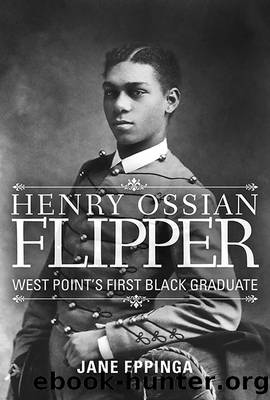Henry Ossian Flipper: West Point's First Black Graduate by Jane Eppinga

Author:Jane Eppinga [Eppinga, Jane]
Language: eng
Format: epub
ISBN: 9781556225048
Google: FO49AQAAIAAJ
Publisher: Republic of Texas Press
Published: 1996-01-15T00:41:27+00:00
Chapter 6
Flipper Returns to the Frontier
Twenty-seven year old ex-lieutenant Henry Flipper could not go home to Thomasville because neither the town nor his family wanted anything to do with him. They felt disgraced and all thought he was guilty. It is a family rift which continues to modern times.1 Flipper arrived in El Paso, Texas on July 3, 1882, aboard a Galveston-Harrisburg and San Antonio Railway train. In his company was an attractive, intelligent, black woman, Florida J. Wolfe. Wolfe, better known in El Paso as Lady Flo, became the common-law wife of Lord Delaval Beresford, after Flipper deserted her.2
El Paso, situated north of the Rio Grande, was connected by bridges to Juárez in the Mexican state of Chihuahua. The prosperity of both towns had expanded with the arrival of the railroad. Along with the railroad, came preachers and prostitutes, miners and merchants, soldiers and solid citizens, and that fringe of society who continually glance over their shoulders with apprehension of an arrest. These newcomers confronted the much older Hispanic culture of Mexico, which had already established itself on the southern banks of the river. Economic and social changes were evolving in both towns, when Flipper arrived.
Flipper found a large community of blacks in El Paso. Most of the men were ex-Buffalo Soldiers, who settled in El Paso after their military stint was over. Their families, along with many whites, held Flipper in high regard.
In his own words, Flipper did nothing of importance for about a year. However, this is not altogether true. He went to work almost at once in a laundry office. He also wrote articles for the El Paso Times, published by Marcellus Washington Carrico, a controversial political figure. The young burly Carrico, who firmly believed in Flipperâs innocence, lost control of the paper, but went on to become city editor of the Fort Worth Gazette, and established trade journals in Chicago and New Orleans.3
El Pasoans welcomed their new resident and the Times staunchly defended him by announcing that ex-lieutenant Flipper was making an honest living in the city. According to the paper, the fact that he worked in the office of a city laundry proved that he had courage and is made of better stuff than some suppose.
Carrico believed that many men would have thrown themselves away completely after suffering through Flipperâs ordeal, and it was to his credit that he strived to build himself up, with the hope of one day seeing justice done.4
Flipper still cherished the hope that his influential friends would bring his court-martial before the next congress and help get him reinstated in the army. He could not accept the fact that these friends if they had ever existed either had no power or had deserted him.
The St. Louis Republican reported that Flipperâs supporters did him poor service by leading him to believe that anything at all would be done for him through congressional channels, and that âhe ought to open his eyes to that fact.â Furthermore, the Republican announced that there was no law making a âcolored man any better than his white brother.
Download
This site does not store any files on its server. We only index and link to content provided by other sites. Please contact the content providers to delete copyright contents if any and email us, we'll remove relevant links or contents immediately.
| United States |
In Cold Blood by Truman Capote(2702)
Steve Jobs by Walter Isaacson(2459)
All the President's Men by Carl Bernstein & Bob Woodward(1972)
Lonely Planet New York City by Lonely Planet(1857)
The Murder of Marilyn Monroe by Jay Margolis(1752)
The Room Where It Happened by John Bolton;(1729)
The Poisoner's Handbook by Deborah Blum(1671)
And the Band Played On by Randy Shilts(1632)
Lincoln by David Herbert Donald(1622)
The Innovators by Walter Isaacson(1612)
A Colony in a Nation by Chris Hayes(1531)
The Innovators: How a Group of Hackers, Geniuses, and Geeks Created the Digital Revolution by Walter Isaacson(1519)
Under the Banner of Heaven: A Story of Violent Faith by Jon Krakauer(1426)
The Unsettlers by Mark Sundeen(1347)
Amelia Earhart by Doris L. Rich(1346)
Birdmen by Lawrence Goldstone(1346)
Decision Points by George W. Bush(1261)
Dirt by Bill Buford(1247)
Zeitoun by Dave Eggers(1231)
